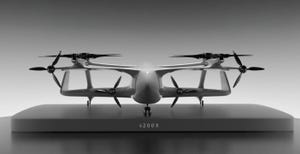Most Read: Flying Vehicle Makes First Test Flight; 300-Mile Range; Figure AI Plans to Ship 100,000 Humanoid Robots Over Next Few YearsMost Read: Flying Vehicle Makes First Test Flight; 300-Mile Range; Figure AI Plans to Ship 100,000 Humanoid Robots Over Next Few Years
Also inside, Waymo to test self-driving taxis in 10 new cities this year, International Year of Quantum launched by UN and more

Here are the most-read stories on IoT World Today this week.
Flying Vehicle Makes First Test Flight; 300-Mile Range
A long-range hybrid VTOL (vertical takeoff and landing) vehicle from Pipistrel has conducted its first hover flight.
The unmanned Nuuva V300 hybrid-electric flying vehicle has a range of 300 nautical miles and can carry a 600-pound payload.
The flying vehicle is powered by a Honeywell fly-by-wire flight control system.
In addition to Pipistrel, a 30-year-old company that became part of Textron in 2022, Honeywell Aerospace also has partnered with major electric aerial vehicle (EAV) makers including Archer Aviation, Lilium, Hyundai’s Supernal and Vertical Aerospace.
Watch the Nuuva V300's first flight
Figure AI Plans to Ship 100,000 Humanoid Robots Over the Next Few Years
Figure AI founder Brett Adcock said his company sees the potential of shipping 100,000 humanoid robots over the next four years.
Adcock made the announcement on a LinkedIn post.
Before it gets there, the founder said there are several steps the company needs to take, including sticking with its strategy to stay focused on a small number of clients.
“Early on, it’s more efficient for us to grow vertically within a few clients than to spread out across many,” he said.
Waymo to Test Self-Driving Taxis in 10 New Cities This Year
Self-driving company Waymo aims to test in more than 10 new cities over the next year as it seeks to expand its leadership in the sector in the United States.
In a post on X, the company confirmed: “On the road again: As Waymo prepares for broader scale, we’re embarking on our largest road trip to date, visiting 10+ cities in 2025. First up: Las Vegas and San Diego.”
The company also subsequently confirmed it would be returning to Washington, D.C., where it conducted some testing last year.
The Waymo “road trip” program is its methodology of assessing its tech in different locations.
International Year of Quantum Launched by UN
The United Nations Tuesday officially inaugurated the International Year of Quantum Science and Technology (IYQ25) at the U.N. Educational, Scientific and Cultural Organization (UNESCO) headquarters in Paris.
The opening ceremony kicked off a two-day event marking the start of a global initiative to celebrate a century of quantum mechanics and its profound impact on modern technology.
It featured keynote speeches by Nobel laureates, discussions on inclusivity and equity in science and panels exploring quantum science's contributions to sustainable development and ethical innovation.
The U.N. proclaimed 2025 as the International Year of Quantum Science and Technology to highlight the importance of quantum science and its applications in achieving the 2030 Agenda for Sustainable Development and its 17 sustainable development goals.
See what industry experts had to say
Generative Quantum AI Framework Launched
Quantum computing company Quantinuum has launched its Generative Quantum AI (Gen QAI) framework, a new approach to quantum-powered artificial intelligence.
The approach uses quantum-generated data to enhance AI systems, unlocking commercial applications in industries including pharmaceuticals, financial modeling and supply chain management.
The framework targets real-world problems where classical computing faces limitations.
Quantinuum's approach uses its H2 quantum computer to generate data to train AI models to improve the accuracy and problem-solving capacity of AI, pushing the boundaries of what is computationally possible.
About the Author
You May Also Like





.png?width=300&auto=webp&quality=80&disable=upscale)
.jpg?width=300&auto=webp&quality=80&disable=upscale)

